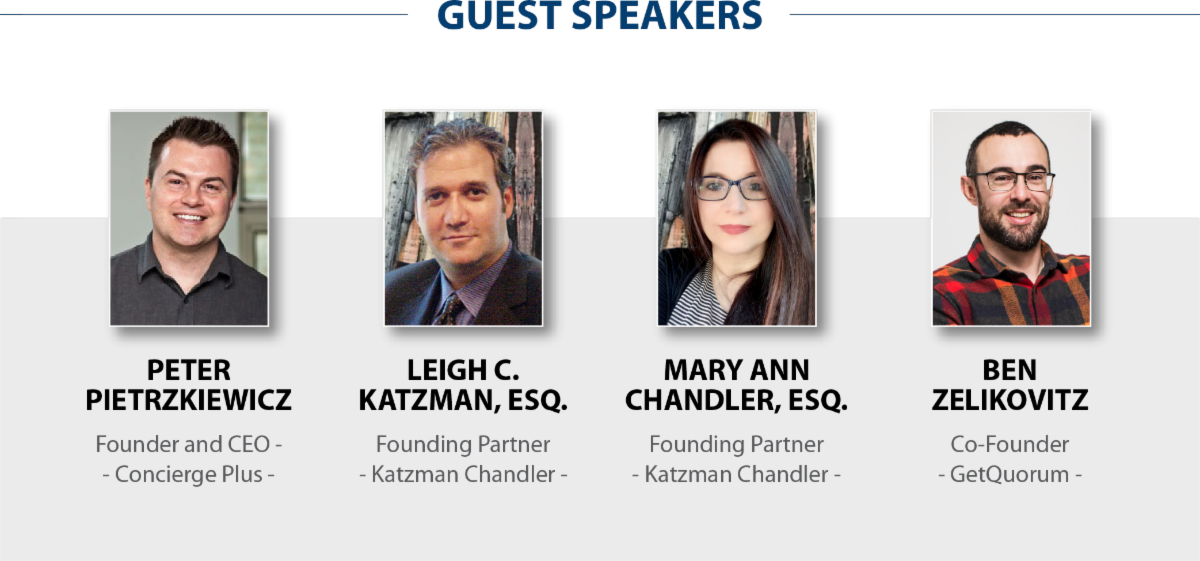The COVID-19 pandemic has no doubt been the catalyst for digital transformation at scale and will have lasting effects on community associations.
To respond to the current and urgent threat of COVID-19, and to lay the groundwork to deal with what may be permanent changes for community associations after the crisis, board members and community managers must take action now.
Before the pandemic, community associations had been moving toward automating manual processes and were offering digital solutions to their residents. Practically overnight, physical distancing and the lockdown of physical spaces have magnified the importance of resident experience management platforms. As an example, a direct result of the outbreak includes the need to meaningfully engage with residents on health and safety in physical spaces. Only community associations that have invested in proper digital technology and have a simplified communication process will be able to provide the ultimate resident experience.
Resident expectations have changed
For those working in residential property management, unusual circumstances introduced by COVID-19 have presented challenges that range from daily administrative tasks, parcel management, along with the pandemic-era mandate to go beyond maintenance and keep public areas sanitized.
Cleaning and sanitation of different building areas, from door handles to elevator buttons, is now daily routine. All staff members should get a daily overview of all staff-related activities, and these new COVID-19 added tasks, must thus be tracked to allow different team members get a real-time awareness of what has been cleaned, and what is yet to gain attention.
When a community association may have to keep its amenity spaces closed for months, creating a differentiated experience will necessarily involve digital offerings. We see a spike in request for a digital amenity booking system that allows a limited number of residents to book and attend a specified time slot. As more residents adopt these digital technologies, residents’ expectations will be raised, and management companies that provide a differentiated post-crisis resident experience will stay ahead of the curve. These digital offerings will pay dividends in the form of superior loyalty and the ability to deliver an ultimate resident experience.
Efficiency has never been more critical
These COVID-19-sparked challenges have led community managers and staff to recognize the old ways of managing their communities simply won’t work during the health emergency and afterward. That’s because other community managers are adopting measures designed to more efficiently perform their operational tasks, and at a time when extra efficiency has never been more critical. These managers feel an even greater sense of urgency than before to automate manual processes and provide a better – and more distinctive – resident experience.
Let’s share an example. Counterparts is a property management company that used to use Microsoft Office to manage resident and community information.
Steve Hydeen, Director of Concierge Services, points out that this was highly inefficient, slow, and created challenges in delivering superior service to their residents. He says, “we were relying very heavily, almost fully, on Microsoft Office.” While Microsoft is one of the most popular software platforms in offices, it was not built for the needs and challenges of property management.

Counterparts ran into problems as they tried to keep up with their residents, and they were having issues getting back to their clients quickly. Residents would move out, and other people would move in without their knowledge because the system took too long to update. According to Steve, it was difficult getting “everyone on the same page and keeping contacts accurate.”
Steve knew there had to be a better way than being purely Microsoft Office-based: “we recognized that they were not long-term solutions.” He worked with other software companies in the past, but none of them performed as well as he had hoped. He considered building their own software to handle their needs but decided that it wouldn’t be the most effective use of their time since it would take too much expense and time to try to develop something.
Steve now uses Concierge Plus to streamline their desk services, resident communications, and internal systems for better community support.
It has dramatically improved Counterparts’ efficiency even with the large number of units his company manages. Steve stated that the company has been able to streamline their software with Concierge Plus: “what we gained is a renewed sense of efficiency because it has allowed us to start eliminating other software.” Their concierge desk has improved both communication and efficiency in the frontline with the platform.
Communication has also improved since implementing Concierge Plus. “It allows us to engage with residents, to provide newsletters, and reach out to everyone or specific individuals very quickly and easily,” says Steve.
Also, customer service was a significant advantage for Steve. Although he has not needed to reach out to customer support often, when he does, he found that “everyone I’ve spoken to is very affirming and supportive. There’s a quick response and almost an extended appreciation for reaching out for support, so I’ve appreciated that immensely.”
Learn how to communicate with your residents in an age when we are practicing social distancing and the benefits of hosting a virtual meeting. Watch our webinar titled Community Association Technology.





Share This Post